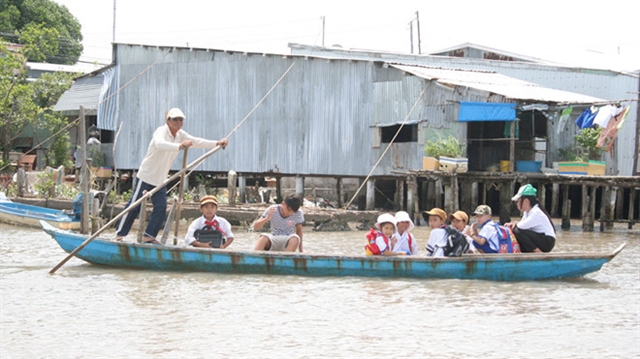 Society
Society


|
| Mekong Delta students ride a boat to school. A complex river system makes it difficult for students to get an education. — Photo thanhnien.vn |
MEKONG DELTA — Some 13 provinces of Việt Nam’s Mekong Delta have requested the Ministry of Education and Training (MoET) develop specialised policies for the region as transport challenges, low budgets and teacher shortages reduce education quality, Thanh Niên (Young People) newspaper has reported.
The Mekong Delta lacks 17,000 teachers, including 11,600 kindergarten teachers.
In 2015, the Government issued a roadmap to reduce at least 10 per cent of teachers on national payroll by 2021, threatening to worsen the shortage in the Mekong Delta.
The region has the lowest percentage of permanent classrooms, with some 11,000 rooms needing renovation to ensure students receive equal education opportunities, according to Phạm Hùng Anh, head of the School Facility Department under the Ministry of Education and Training.
No province in the region has met the level-3 universal primary education standard which requires 98 per cent of 6-year-old children going to school and at least 80 per cent of students aged 11 finishing the primary education program.
Up to 55 per cent of Việt Nam’s students who drop out are in the Mekong Delta with poverty, unsustainable livelihoods and traditional customs are pointed out as the main causes.
Many students are forced to leave school to work and support their families. Another large portion of children follow their families to other areas in seek of better livelihoods and never return to school.
According to MoET, from 2011 to 2016, the budget expenditure for education of Mekong Delta provinces was VNĐ155 trillion (US$6.66 billion), accounting for 15.9 per cent of the country’s expenditure, while regional students made up for 17.5 per cent of the country’s total number.
The average budget payment for a student in Mekong Delta is 11.9 per cent lower than the national average.
Not only is the local budget for education limited, State assistance for localities reaches a small percentage compared to other regions, namely disadvantaged, mountainous and ethnic minorities areas.
A representative of Long An Province recommended setting the locations of schools as a focal point in transport infrastructure development plans, since the area has a complex system of rivers, which makes it difficult for students to get to school.
Education minister Phùng Xuân Nhạ said the ministry was developing a set of indicators to evaluate education quality, identify problems at each locality.
“It is impossible to tackle issues in every single locality using general policies,” he said, “We need to take local characteristics into consideration to encourage them to thrive.”. — VNS




